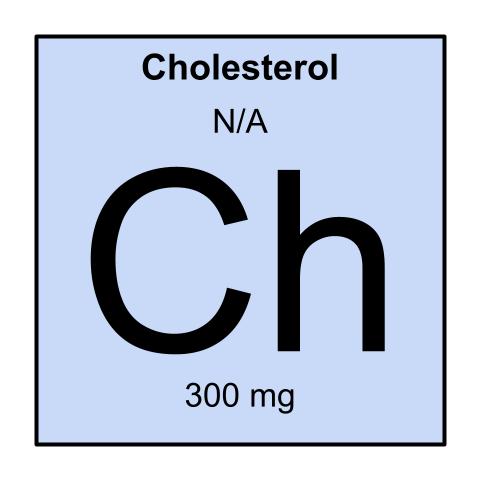“Cholesterol is the most common steroid and is the precursor to vitamin D, testosterone, estrogen, progesterone, aldosterone, cortisol, and bile salts.” Steroids serve two functions: as components of cell membranes they alter fluidity, and as signaling molecules. The brain has the highest concentration of cholesterol in the body. High cholesterol is healthy, unless one has insulin sensitivity, which increases risk of arterial plaque build up leading to heart disease and stroke. Healthy sources include eggs, cheese, shellfish, pasture-raised steak, organ meats, sardines, and full fat yogurt.
Quick Facts
-“Cholesterol is the most common steroid and is the precursor to vitamin D, testosterone, estrogen, progesterone, aldosterone, cortisol, and bile salts.” Steroids serve two functions: as components of cell membranes they alter fluidity, and as signaling molecules [34][35]
-The brain has the highest concentration of cholesterol in the body and cholesterol is essential for growth and development of the brain [154]
-Since cholesterol is a lipid, it doesn’t dissolve in water so can’t be moved in the blood by themselves. Instead, they are carried in vehicles called lipoproteins, which are water soluble on the outside, and lipid soluble on the inside. There are two types of lipoproteins: Low density lipoproteins (LDL), and high density lipoproteins (HDL). The less protein there is relative to lipid in the lipoprotein, the less dense it is.
-Essential for animal life, and synthesized by all animal cells [36]
-Cholesterol is a component of the phospholipid bilayer and plays a role in the structure and function of membranes.
-Steroids are found in the brain and alter electrical activity in the brain because they can tone down receptors that communicate messages from neurotransmitters, steroids are often used in anesthetic medicines.” [37]
-Typically, 25% is obtained from diet, and 75% is made in the body. Eating cholesterol only raises blood cholesterol in 25% of people because most people’s bodies stop producing internally if enough is obtained from diet, and because the body tightly controls blood cholesterol levels [38]
RDI
300 mg [128]
Deficiency
-Abnormally low cholesterol in the blood is called hypocholesterolemia
-A meta-analysis including over 1.4 million subjects and almost 7960 hemorrhagic strokes in these subjects compared those with high blood levels of cholesterol compared to those with low levels. Those with high levels of total blood cholesterol were 69% as likely to get a stroke, those with high levels of HDL were 98% as likely (little difference), and for LDL it was 62% [155]
Toxicity
-Consuming more cholesterol does not translate to higher blood levels of cholesterol because the body tightly regulates the amount of cholesterol in the blood by controlling production. So other factors are important if the blood levels of cholesterol are too high [156]
Sources
Healthy
Eggs (1 egg = 70% RDI), cheese, shellfish, pasture-raised steak, organ meats, sardines, full fat yogurt
Unhealthy
Fried foods, fast food, processed meats, desserts like cookies, cakes, ice cream etc.
[159]
HDL
-“Good cholesterol”
-HDL is thought to bring cholesterol and phospholipids back to the liver, and more HDL is correlated with better health outcomes, whereas less is associated with build up of plaque in the arteries. Once in the liver, cholesterol and phospholipids are redistributed to other parts of the body, or removed from the body
Deficiency
-Low levels of HDL is called familial HDL deficiency and may develop cardiovascular disease at a young age (before 50) [153]
-Mutations in the ABCA1 gene or the APOA1 gene can cause familial HDL deficiency
Toxicity
-See toxicity for cholesterol above
LDL
-“Bad cholesterol”
-LDL is responsible for most movement of cholesterol throughout the blood, and when there is too much compared to what cells can absorb, they are taken up by macrophages, and the macrophages turn into ‘foam cells’, which get caught in artery walls contributing to plaque build up, the main cause of heart attacks and strokes
RDI
Included in cholesterol RDI
Deficiency
-Is associated with reducing the risk of strokes in one large meta-analysis [155]
Toxicity
-See toxicity for cholesterol above

